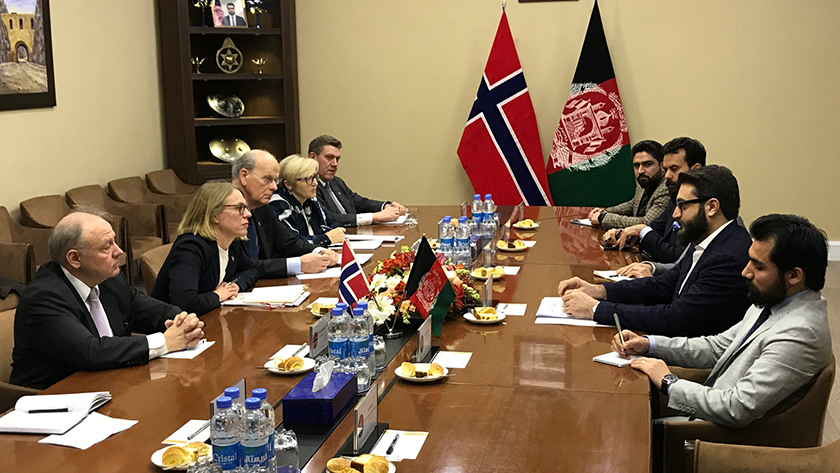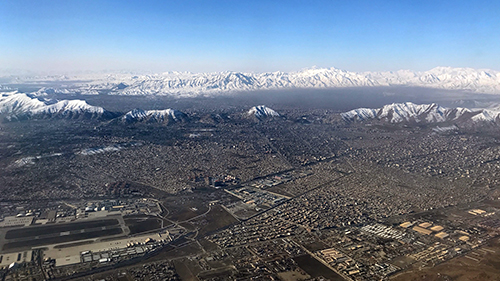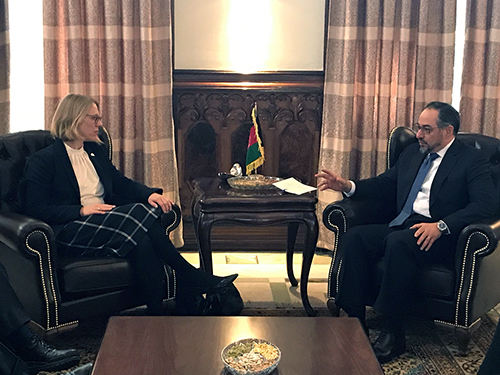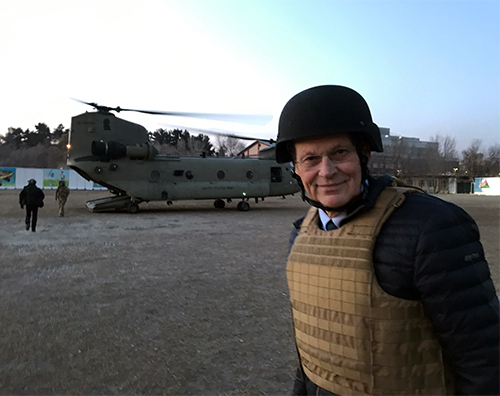
The committee delegation meeting with Afghanistan’s National Security Adviser, Hamdullah Mohib. Photo: Storting.
Committee on Foreign Affairs and Defence visits Afghanistan
A delegation from the Storting’s Standing Committee on Foreign Affairs and Defence visited the Afghan capital, Kabul, on 26–27 February 2019. The purpose was to gain deeper insight into the situation in Afghanistan.
For Norwegian development policy, Afghanistan is a high-priority country to which Norway has committed approximately NOK 2.3 billion in the 2017–2021 period. Norway is also an important contributor of forces to NATO’s Resolute Support (RS) mission in the country. It was important to the committee to obtain a deeper understanding of the Afghan situation and the use of Norwegian development funds as well as to visit the Norwegian forces in Kabul and be updated on their duties.
Welcomed
Upon arrival the committee was welcomed by representatives of the Norwegian Embassy in Kabul and briefed by embassy staff on Afghan developments. Norway’s Ambassador to Afghanistan, Kjell Tormod Pettersen, served as host and participated with the delegation in all the meetings.
The delegation first met a group of representatives of Afghan civil society, the media and the Afghan parliament. Afterward was a meeting with local representatives of the largest Norwegian NGOs active in Afghanistan, including Norwegian Church Aid, Norwegian People’s Aid, the Norwegian Afghanistan Committee and the Norwegian Refugee Council, and with representatives of the United Nations and the International Committee of the Red Cross (ICRC).

Kabul seen from the air. Photo: Storting.
In both meetings, the Storting delegation received a frank assessment of the challenges the country faces almost 18 years after the Taliban regime’s ouster from power in 2001. In some ways Afghan society has developed positively, including the areas of press freedom, health services, constitutionally based democratic rights and gender-neutral rights to education. Meeting participants made it clear, however, that a great many challenges remain, such as government corruption, narcotics trafficking, women’s rights and a peaceful resolution of the battle against the Taliban. This increasingly demanding conflict claimed about 20,000 lives in 2018, including almost 4,000 civilians.
Today the Taliban more or less controls about 50 per cent of Afghanistan’s districts. According to meeting participants, Afghans want peace but not at the price of a Taliban regime like that which ruled before 2001. A peaceful resolution with the Taliban must include preservation of the people’s rights under the constitution, with integration of the Taliban into the political system on par with other political actors in Afghanistan. For the situation in Afghanistan to develop in a positive direction, established security structures, even if weak, must be sustained and strengthened. Positive developments in Afghanistan will require continued Western support for many years to come.
Meeting the National Security Adviser
At Afghanistan’s presidential palace the delegation was received by National Security Adviser Hamdullah Mohib, who outlined the security situation in Afghanistan. He specifically addressed how the Afghan authorities view ongoing peace talks between representatives of the United States and the Taliban in Doha, where the Afghan government is not a party. Dr Mohib emphasised the need for full Afghan involvement and respect for Afghanistan’s constitution and constitutionally based institutions in an Afghan peace. In March President Ghani will hold a consultative Loya Jirga (an Afghan assembly attended by the country’s most important and powerful people) to which the Taliban will be invited. The purpose of the assembly is to prepare the way for peace talks with the Taliban.
Dr Mohib pointed out that peace talks with the Taliban would be very complicated in part because the Taliban is not a unified organisation but is to some extent an amalgam of different groups with different demands to the authorities for accepting a peaceful resolution. Parts of the Taliban are unlikely to accept an arrangement other than the pre-2001 situation. It is therefore important to avoid oversimplifying the present situation. The key message was that no simple solution exists for creating a lasting peace in Afghanistan.
Working lunch with representatives of Western embassies
The delegation then had a working lunch with representatives of a number of Western embassies in Kabul, including those of the United States, the United Kingdom, Germany and the European Union. Here, too, the ongoing peace talks in Doha and the possibility of a lasting peace settlement were among the main topics. Several diplomats reiterated the need for continued Western economic and military support to the Afghan government in the years to come. International support accounts for about 45 per cent of the Afghan national budget – a budget in which some 40 per cent of expenditures relate to the country’s security forces.

The committee delegation meeting with Afghanistan’s National Security Adviser, Hamdullah Mohib. Photo: Storting.
Afghanistan’s Foreign Minister thanks Norway
The delegation was also received by Afghanistan’s Minister of Foreign Affairs, Salahuddin Rabbani, who thanked Norway for supporting the reconstruction of Afghanistan through both financial support and military contributions. Rabbani explained the impact of neighbouring countries such as Iran and Pakistan, as well as of Russia’s role, on Afghanistan’s situation and development. Mr Rabbani, like Dr Mohib, emphasised the importance of Afghan leadership in a Taliban peace process.
Briefed on NATO mission in Afghanistan
In a meeting with Lt Gen Camporeale, deputy commander of NATO’s mission to Afghanistan, the delegation was briefed on NATO’s operations in the country, which focus on training, advising and supporting Afghan security forces. NATO currently has about 16,000 soldiers in Afghanistan. Key areas of success have been logistical support and anti-corruption support. Lt Gen Camporeale expressed clearly his positive view of the Norwegian force contribution, which has tackled its assigned mission very professionally.
Visit with Norwegian soldiers
The final part of the visit was spent with Norwegian soldiers, mainly from the Norwegian Naval Special Operations Command, serving in the Special Operations Advisory Team (SOAT). The Norwegian forces mentor the Afghan special police in Kabul, for whom anti-terrorism is a key task. The delegation was given briefings on the mission and on the positive results achieved during the period. The delegation spent an enjoyable evening with the Norwegian soldiers.

The committee’s First Deputy Chairman, Michael Tetzschner, about to board a U.S. CH-47 Chinook transport helicopter. Photo: Storting.
“As chair of the Committee on Foreign Affairs and Defence I often hear from close allies about the important role played by Norway’s military contribution in Kabul in the fight against forces that want to see Afghanistan develop differently than the country’s elected government,” says Anniken Huitfeldt.
“It has been very useful to visit both the representatives of Afghan authorities and our soldiers serving in Kabul. We met very reflective and skilled Norwegian soldiers who told us about the work they do. It was also important for us to hear directly from Afghan authorities about the significance of our current and future presence, as well as the importance of continued financial support for the development of a sustainable Afghan state based on constitutional rights,” she says.
The following committee members participated in the trip: Anniken Huitfeldt, Chair (Labour Party); Michael Tetzschner, First Vice Chair (Conservative Party); and Liv Signe Navarsete (Centre Party).